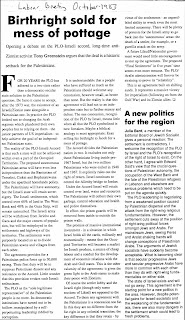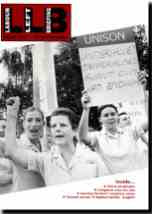cc
vv
dd
rr
ee
ww
qq
aa
ss
dd
ff
dd
dd
dd
dd
dfdf
dfdf
dfdf
dfd
As you get older you tend to revisit previous writings. An old article I had forgotten about was a debate with Julia Bard of the Jewish Socialists Group in the pages of Labour Left Briefing of October 1993 re Oslo.
People may remember the Oslo Accords when everything was going to be sorted out in Palestine. All that was needed was an honest broker, the USA and an ability to reach out and ‘understand’. Drawing on the process that was underway in South Africa, without ever understanding what it was that was making Apartheid there crumble, the PLO leadership sacrificed all for the honeyed words of Rabin and Peres.
In Britain, Palestine Solidarity Campaign, at an Extraordinary General Meeting, with Uri Davies arguing strongly in support, passed by 2-1 a resolution supporting Oslo. In response many of us who were founding members walked out of PSC. Unfortunately neither PSC nor many others learnt the lessons of Oslo. These can be summed up as follows:
Arab nationalism in its historical reaction to British colonialism and the first phases of Zionism is dead. The Arab regimes today are divided between different forms of reactionary politics with a few clowns like Ghadaffi in between. The Arab world is, of course divided amongst itself and large chunks of it are now overtly in the camp of Israel. Which is not surprising since the Saudi state and the Gulf Emirates have historically relied on imperialism for survival.
But the Palestinian Question is eminently one of the international class division of labour. That means quite succinctly that there is no united national front now possible in Palestine. The enemies of the Palestinians are both their own Quislings (Abbas/Fayed) and the Arab regimes. To pretend otherwise is to engage in delusion. There can be no blockade of Gaza without Egypt. There can be no attack on Iran without Saudi Arabia. Those who steal the oil wealth from the Arab masses and spend it in the casinos of Monte Carlo and London are no less thieves than those who stole the land of the Palestinians.
And whilst they cut the hands and legs of the poor who steal a loaf of bread in Saudi Arabia and Iran, those who steal the nation’s wealth are given titles instead. Class struggle is alive and well and religion is the weapon of the rich in the Arab lands. The Shi’ite branch of Islam no less than its Sunni counterpart is equally reactionary, as Iran demonstrates. Social revolution throughout the Middle East and the toppling of the Egyptian and Saudi regimes is a sine qua non for the overthrow of Zionism.
Hindsight is, of course, a wondrous thing. Foresight is rarer. However the article I penned for National Labour Briefing in October 1993 was neither of these things. What it did do was dispense with liberal woolly thinking and an abandonment of class analysis. Questions such as what is/was the role of the Arab ruling class in the region, the balance of power, the role of different strata within Palestinian society, the international balance of class forces within Palestine and the disparity in strength between Israel and the Palestinians. All this was dispensed with in favour of hope that somehow Israel had, like the leopard, changed its spots.
I can remember attending a UN Conference in Austria around September 1989 on behalf of Return, a magazine of Jewish anti-Zionists, at which this type of atmosphere was prevalent. All the peaceniks were there in force. Mention of Zionism was strictly verboten. It was all a question of ‘misunderstandings’ and ‘mutual recognition’. Once a form of words was agreed then all was possible. Nabil Shaath, one of the key Palestinian collaborators was in full flow. We were on the brink of ‘new politics’ etc. etc.
Today, of course, Oslo is a distant dream but its corrosive effects are still present. One only has to look at the politics of the PSC Executive to see that. Even now they harbour hopes in Abbas and co, refusing to condemn them even as they encourage Israel to remove Hamas in Gaza. Class politics is still verboten. They cite South African apartheid without ever understanding the politics that lay behind its removal. Boycott played a key part but it was not the only part. Black South Africans were actors too and created organisations which helped create the climate which led to its dismantlement. The Palestinians have failed in this regard so far. There are, of course, other differences, but the debate I had with Julia Bard of the Jewish Socialists Group is instructive.
Reading back, of course, some things I got wrong, for example the fact that the settlers withdrew from Gaza but overall the article stands the test of time.
Tony Greenstein
Opening a debate on the PLO-Israeli accord, long-time anti-Zionist activist Tony Greenstein argues that the deal is a historic setback for the Palestinians.
FOR 20 YEARS the PLO has adhered to a two-state rather than a democratic-secular state solution to the Palestinian question. De facto it came to accept, after the 1973 war, the existence of an Israeli/Zionist state alongside a Palestinian one. In practice the PLO looked not to changing the Arab regimes which plundered their own peoples but to relying on them – the junior partners of US imperialism – to help achieve the goal of an independ-ent Palestinian state.
The reality of the PLO-Israeli Accord is that such a state will not be achieved within even a part of the Occupied Territories. The proposed autonomous Palestinian areas will have even less independence than the Bantustans of Transkei, Ciskei and Bophutatswana under the apartheid homelands policy. The Palestinians will have autonomy, but the Israeli state will retain sover-eignty. The Israeli settlements, which control over 60% of land in The West Bank and 40% in the Gaza Strip, will remain untouched. The Israeli army will be withdrawn from Jericho and Gaza and the major centres of popula-tion, but will be redeployed in the settlements and highways of the territories. The settlements were purposely located so as to divide Palestinian towns and villages from each other.
The agreement provides for a Palestinian police force up to 30,000 strong. Their first duty will be to suppress Palestinian dissent and any resistance to the Accord. Little wonder that this provision evokes such Israeli enthusiasm.
The PLO as the “sole legitimate representative” of the Palestinian people is no more. Its democratic institutions have turned out to be hollow, manipulated by a self-perpetuating leadership riddled by corruption.
It is understandable that a people who have suffered as much as the Palestinians should welcome any concession, however small, as better than none. But the reality is that this agreement will lead not to an inde-pendent state but to further misery and defeat. The one concession, recogni-tion of the PLO by Israel, means little when all that the PLO symbolised is now forsaken. Maybe a biblical analogy is most appropriate: Esau selling his birthright to Jacob for a mess of pottage.
The Accord divides the Palestinian nation in two. It excludes not only _ those Palestinians living inside pre-1967 Israel, but the two million Palestinians who were exiled in 1948 and 1967. It explicitly rules out the right of return. Israel continues to control the Allenby bridge to Jordan.
Under the Accord Israel will retain control over land, water and resources. The Palestinians will collect their own garbage, control education and health and police themselves.
In effect, the prison guards will be removed from inside to outside the prison walls.
The promise of massive international investment – in a situation in which Israel holds all the cards, militarily and economically – means that the Occu-pied Territories will become a market for Israeli produce, a source of cheap labour and a conduit for the develop-ment of economic relations with the Arab and Gulf states. This is the other calamity of the agreement: it gives the green light to the Arab states to make their peace with Zionism.
Of course the settler lobby and the Israeli right (though only some sections of Likud) are opposed to the Accord. To them any agreement with the Palestinians is a concession too far. In this they are no different from the far-right in any colonial transition; the key difference is that they retain – by virtue of the settlements – an unparal-leled ability to wreck even the most limited autonomy. There will be plenty of pretexts for the Israeli army to go back into the ‘autonomous’ areas: the death of a settler, for example, or a guerilla attack on the army.
A future Likud/Nationalist govern-ment would need little encouragement to tear up the agreement. The proposed “Final Settlement” in five years’ time seems even more tenuous. The PLO/ Arafat administration will forever be straining to prove its “reliability”.
This is an agreement built on shifting sands. It represents a massive victory for imperialism (following on from the Gulf War) and its Zionist allies.
A new politics for the region
Julia Bard, a member of the Editorial Board of Jewish Socialist gives a personal reaction:
The settlement is contradictory. I welcome the recognition of the PLO by Israel and the PLO’s recognition of the right of Israel to exist. On the other hand, I agree with Edward Said’s view that the crucial ques-tions of Palestinian autonomy, the occupation of the West Bank and the fate of the Palestinian refugees in Lebanon and elsewhere are serious problems which need to be put on the agenda quickly.
The PLO leadership is negotiating from a weakened position caused by Palestinian dispersal and the attack from the right-wing religious fundamentalists. However, the settlement cuts away at the position of right-wing political forces amongst Jews and Arabs. For mainstream Jews, seeing Peres and Arafat shaking hands will change conceptions of Palestinian Arabs. The arguments of Jewish socialists have suddenly become acceptable. What is becoming clear is that secular progressive Jews and secular progressive Arabs have more in common with each other than they do with right-wing funda-mentalists on either side.
The stale of Israel exists and will not go away. This agreement is the starting point for a new politics in the area. However, despite potential gains for Israeli socialists and the weakening of the fundamentalists, there are also many dangers in the settlement which could lead to fresh problems.





